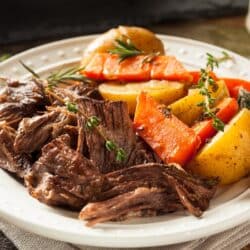Is Gardein Healthy (From a Nutritionist)?
In this blog post, I’ll review the question of whether Gardein plant-based meat products are healthy or not? Find out what this product’s nutrition pros and cons are, plus some better options to consider. For most people, Gardein meat substitutes are not healthy because they are highly processed with some questionable ingredients.

Gardein Facts
Gardein is a manufactured food brand specializing in plant-based meat alternatives, designed to mimic the taste and texture of various animal products such as hot dogs, meatballs, chicken tenders, ground beef, and more.
Conagra Brands, a major American food conglomerate known for its wide array of packaged foods, owns the Gardein label of plant-based meats.
Gardein’s products are marketed primarily to vegetarians, vegans, and flexitarians who want a meat alternative due to ethical or religious reasons.
Currently, Gardein fake meat products include five ranges with various products in each:
- Chick’n and Turk’y, including Chick’n Fillets, Chick’n Strips, Turk’y Roast, Savory Stuffed Turk’y, and more.
- Beefless and Porkless, including Meatballs, Breakfast Saus’ge, Ground Be’f Crumbles, Sweet and Sour P’rk Bites, and more.
- Fishless, including Crispy Breaded F’sh Filets, F’sh Filets, and Mini Cr’b Cakes.
- Meals, including Be’f and Broccoli Bowl, Meatball Marinara Bowl, Chick’n Fried Rice Bowl, Sweet & Sour Chick’n Bowl, Be’f Burrito Bowl, and more.
- Soups & Chilis, including Be’f & Vegetable Soup, Chick’n & Rice Soup, Chick’n Noodl’ Soup, Chili No Beans, Chili With Beans, and more.
Gardein markets these processed foods found at grocery stores as quick and easy ways to enjoy plant-based dishes at home. They are created to be versatile and convenient options for people who want to incorporate more plant-based foods into their diets.
Common ingredients include soy protein isolate, wheat, canola oil, and various seasonings and additives like methylcellulose and titanium dioxide. Many Gardein food products are high in sodium and contain allergens like soy and wheat.
Gardein Ingredients
Here are some of the main ingredients in Gardein products and how they can impact your health.
Enriched Wheat Flour
Gardein products use enriched wheat flour as a key ingredient, offering benefits and drawbacks.
On the positive side, enriched wheat flour is fortified with nutrients like iron and B vitamins, which support energy metabolism and overall health.
However, because it is highly processed, it lacks the fiber and nutrients found in whole grain flour, potentially leading to rapid blood sugar spikes which can lead to other health issues down the road.
Additionally, wheat flour and other wheat-based products can cause digestive health problems for people sensitive to gluten.
Canola Oil and Sunflower Oil
Canola and sunflower oils are industrial seed oils that can cause health problems, especially in those with sensitivities or allergies.
High in omega-6 fatty acids, these processed oils can contribute to inflammation, potentially worsening conditions like arthritis, cardiovascular disease, and inflammatory bowel disorders.
These oils are also often derived from GMOs, raising concerns about potential health risks.
Soy Protein Isolate (SPI)
Soy protein isolate (SPI) is a heavily processed protein sourced from soybeans, offering a plant-based protein option.
However, this ingredient does come with some potential health concerns. Many soy products, including SPI, contain phytoestrogens and may be genetically modified, influencing hormone levels in the body.
Pea Protein
Pea protein is a high-quality plant-based protein derived from yellow peas. Food manufacturers usually use it to boost the protein content in foods like protein powders, bars, and other processed foods.
Rich in iron and suitable for vegans, pea protein is popular with those seeking a plant-based alternative. However, individuals with sensitivities to peas should avoid products containing pea protein.
It’s also important to note that pea protein is much less bioavailable than animal-based proteins including whey.
Methyl cellulose
Methyl cellulose is a synthetic compound derived from cellulose, a polymer that naturally occurs in plant cell walls.
Manufacturers use it in food products as a thickening agent, emulsifier, and stabilizer. In processed foods like Gardein, methylcellulose helps achieve the desired texture and consistency of traditional meat products.
However, our bodies cannot metabolize methyl cellulose. It passes through our digestive systems largely unchanged, offering no nutritional value.
Additionally, it can cause digestive issues in some individuals, including bloating, gas, and discomfort, particularly when consumed in large quantities.
Titanium dioxide
Titanium dioxide is a commonly used white pigment found in various products, including food, cosmetics, and paints.
Manufacturers use this additive to enhance the whiteness and opacity of products. However, it may have adverse health effects.
This additive may accumulate in the body and cause oxidative stress, leading to inflammation and possible cell damage. Additionally, titanium dioxide has been linked to adverse effects on the gut microbiome and has been classified as a potential human carcinogen by some health agencies.
Although the FDA and other regulatory bodies deem titanium dioxide safe in small quantities, ongoing research and emerging evidence highlight the need for caution, particularly with long-term or high-volume consumption.
Natural Flavors
The term “natural flavors” on ingredient labels, such as those found in Gardein products, lacks a precise definition. It gives manufacturers leeway to use the term to broadly encompass any flavoring derived from natural sources.
However, this definition is vague and does not specify the processes or additives involved in creating these flavors. Therefore, “natural flavors” might be produced using various undisclosed methods, some of which may include artificial substances or potentially harmful practices.
Without any clear regulations or requirements for disclosing the exact extraction methods, producing “natural flavors” might involve chemical extraction, high-heat treatments, or enzyme-assisted extractions that may use solvents.
These unsafe methods can lead to unwanted chemicals or residues ending up in the final product. This lack of transparency and clear definition means that natural flavors may not be suitable for health-conscious consumers.
Nutrition Pros
Gardein products are not considered healthy for most people due to the highly processed ingredients. If you are on a vegan diet or plant-based diet, you should likely not consume these products regularly.
However, they offer a convenient, easy, and quick option for those looking to incorporate plant-based meals into their diet without significant preparation time. Some of the Gardein products are soy-free (refer to the Gardein website for the most up to date ingredient labels).
While there may be some health benefits for some people in reducing their consumption of red meat, it’s best to consult your healthcare provider before adding in highly processed foods from companies like Gardein, Beyond Meat, or Impossible Burger.
Nutrition Cons
While popular for their convenience and appeal to those seeking plant-based alternatives, Gardein products have several health drawbacks.
These products are highly processed and contain unhealthy additives and questionable ingredients such as methylcellulose, titanium dioxide, fructose, and soy protein isolate, yeast extract, vital wheat gluten, and refined oils which may impact health in the long term.
Ingredients like “natural flavors” can be vague and potentially involve harmful extraction processes, further complicating the nutritional profile.
Additionally, Gardein products are high in sodium and may contain allergens like soy and gluten that could affect sensitive individuals.
Try These Vegan Recipes Instead of Gardein
Conclusions
Gardein food products offer a convenient option for those seeking plant-based alternatives. However, they are highly processed and contain potentially concerning ingredients such as methylcellulose, titanium dioxide, fructose, soy protein isolate, and high sodium levels.
Additionally, the vague term “natural flavors” and the presence of allergens such as soy and gluten can pose risks to certain individuals. Skip these plant-based proteins at the grocery store. A healthier alternative is to make your own plant-based meals using whole, natural ingredients such as black beans, lentils, quinoa, and fresh vegetables seasoned with herbs and spices.
Don’t forget to join my newsletter list to get exclusive clean eating recipes and tips. The newsletter is 100% free with no spam; unsubscribe anytime.
About the Author: Carrie Forrest has a master’s degree in public health with a specialty in nutrition and is studying to be a holistic nutritionist. She is a top wellness and food blogger with over 5 million annual visitors to her site. Carrie has an incredible story of recovery from chronic illness and is passionate about helping other women transform their health. Send her a message through her contact form.
Note: this post is for informational purposes only and is not intended as medical advice. Please consult your healthcare provider for recommendations related to your individual situation.




















